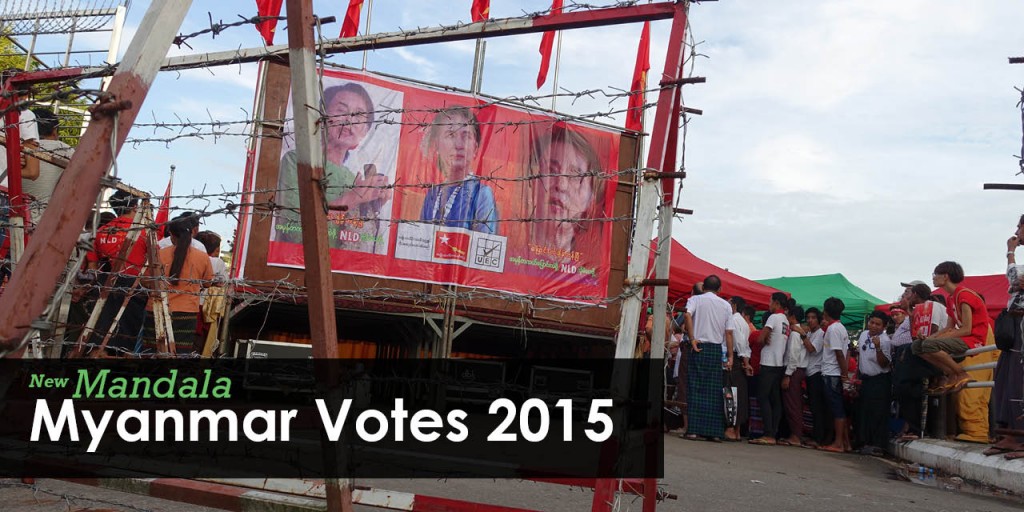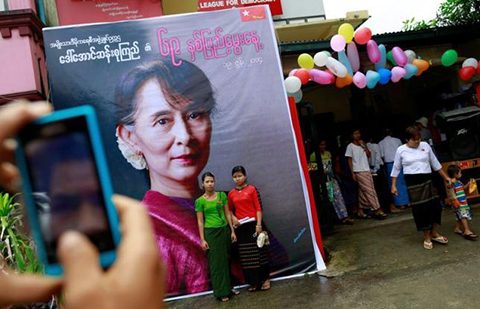
Today, Myanmar gets its chance to vote. What happens tomorrow is equally important.
Today’s vote in Myanmar pits the incumbent Union Solidarity and Development Party against Aung San Suu Kyi’s National League for Democracy.
In one corner is the successor to the old military regime, reincarnated as a civilianised political machine that claims ownership of the reform process. In the other are the long-suffering democratic and ethnic opposition parties, all eager to right the wrongs of history.
Even though a carefully stage-managed general election was held in 2010, and a pivotal by-election in 2012, this is the biggest test of Myanmar’s fragile democratic evolution.
After waiting impatiently, 23 million registered voters now get a real chance to have their say.
The quality of the vote is still uncertain, but it looks like a great advance on what happened in November 2010 when then the National League for Democracy boycotted the poll and other democratic parties fared poorly.
It was only in some ethnic areas, particularly in the Mon, Shan and Rakhine States, that alternative voices gained ground. Elsewhere, military-aligned interests maintained their strangleholds.
This time there are 6,189 candidates from 91 parties contesting 1,171 constituencies. Around a dozen parties will likely pick-up useful numbers of seats, with some micro-parties, and some independents, also in contention.
It is an exciting moment: technological and cultural change are creating new political possibilities.
Over the past 18 months there have been 16.6 million more mobile phone subscribers signed up by Norway’s Telenor and Qatar’s Ooredoo, the quick-footed foreign telco players.
With smartphones newly abundant, this election campaign is being run on Facebook, which has become the ecosystem of choice for the country’s Internet users.
It is fast, colourful and makes the use of Burmese fonts straightforward. It helps that the platform offers natural advantages for people whose flair for gossip, humour and criticism has long helped lubricate social interaction.
And it is not just mobile Internet use that is different now. Across all media, this is the first time that the Myanmar people have enjoyed such free access to political information. In 2012 draconian pre-publication censorship was abolished, freshening up discussion of countless difficult issues.
I have seen this firsthand through my local newspaper column, which offers an Australian-accented take on Myanmar’s political and social changes.
This year my weekly contributions have dealt with a huge range of topics; everything from the Facebook use of the Commander-in-Chief of the Armed Forces to the arrival of KFC in Yangon.
The most important columns have dealt with unresolved questions of ethnic conflict and religious tension. The disenfranchisement at this election of perhaps a million Muslim voters, and the disqualification on spurious grounds of many Muslim candidates, deserves more scrutiny.
What stands out for me is that these critical appraisals have been published, without sanction, in local media, and broadcast far-and-wide through Facebook channels.
Myanmar people who take the time to respond are usually happy that such open debate can occur, even when they disagree with aspects of my analysis. I encourage this back-and-forth discussion, hopeful that new cultures of productive interaction can follow.
After so many years when people had no easy access to uncensored news, it makes sense that the transformation of public debate will generate some problems. Anti-Muslim hate speech festers in dark corners.
Yet the overall picture of Myanmar politics is more positive than ever, and certainly much rosier than its neighbours, Bangladesh and Thailand. Those two countries are still a long way from finding peaceful and sustainable mechanisms for managing internal conflict. Today both are run by undemocratic elites fearful of electoral competition.
For now, what makes Myanmar politics different is the gradual surrender of primacy by the military and the repositioning of Aung San Suu Kyi as a hard-ball politician.
While the past half-decade of more open political activity has rubbed off some of the gloss from her saintly persona, she has become a more formidable political operator and likely a more popular one too.
For Aung San Suu Kyi, gone are the novice missteps and the hesitant idealism, replaced by a tough-minded appreciation of what it will take to fully dismantle the machinery of dictatorship. As she tells the boisterous crowds at her campaign rallies, she needs to win power before she has any chance to right some of the country’s lingering wrongs.
If today’s vote goes in her favour then the people of Myanmar will look to Aung San Suu Kyi for personal leadership.
Yet she knows that, whatever the outcome, there will have to be arduous negotiations with military-aligned interests still looking to retain control.
It is the struggle and compromise that comes after today’s vote that will prove most important of all.
Dr Nicholas Farrelly is Director of the Myanmar Research Centre at the Australian National University, a Fellow at the Coral Bell School of Asia Pacific Affairs and co-founder of New Mandala.
This article was also published in The Sydney Morning Herald and forms part of New Mandala’s ‘Myanmar and the vote‘ series.
 Facebook
Facebook  Twitter
Twitter  Soundcloud
Soundcloud  Youtube
Youtube  Rss
Rss 